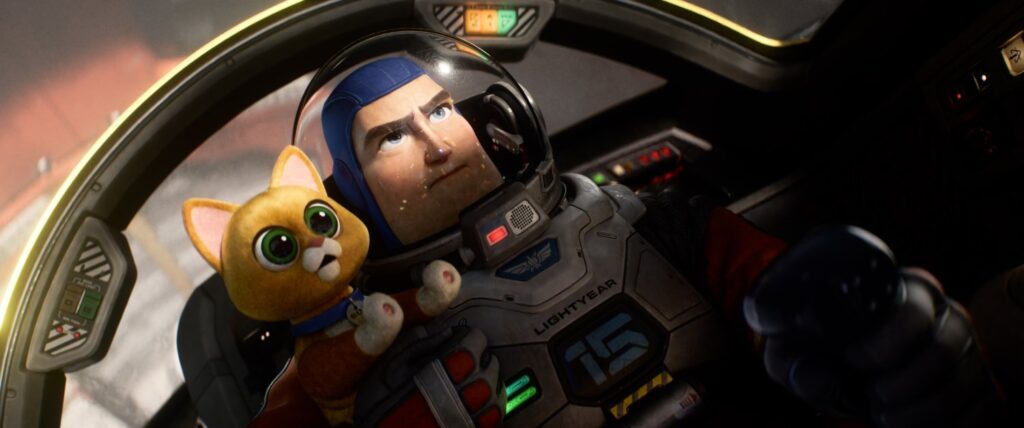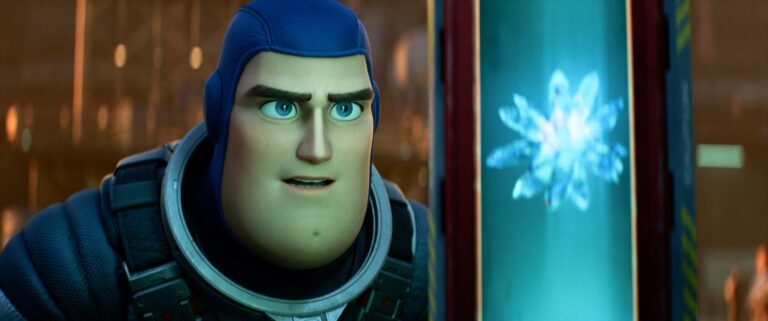If you’ve ever wondered why Andy was so excited to receive a Buzz Lightyear toy for his birthday, Pixar’s latest feature hopes to answer that question. Lightyear purports to be the very same movie Andy saw as a child, the one whose heroic lead character spawned a legion of fans and a lucrative line-up of action figures. Voiced by Chris Evans, the titular Space Ranger crash lands on a hostile planet and embarks on a perilous journey to get his team back home.
Last week, we spoke with Lightyear director Angus MacLane about the inspiration behind the film, the joys of working with the voice cast, and the challenges of completing the film during the COVID-19 pandemic.
(Note: this interview has been lightly edited for length and clarity)
I wanted to start with the the inspiration behind this. I read that you were kind of inspired by those sort of “man out of time” stories like Buck Rogers and Captain America — which is a nice bit of synergy, with Chris Evans voicing the character — but what made you decide that the character and the backstory of Buzz Lightyear was was worth exploring, to the extent that it warranted an entire feature film?
Angus MacLane: Well, I had always been connected to Buzz Lightyear, since I started at the studio in 1997, and after I finished Finding Dory I really wanted to do something that was a little different, like the kind of movie I would have liked as a kid. That’s where I thought it’d be nice to explore the Buzz backstory as a kind of straightforward sci-fi action adventure movie, since we hadn’t really done an action thriller per se, in that way at Pixar.
I thought that would be a fun thing to do, and since you’re stuck with these movies for so long, having something that sounds like fun is a tremendous motivator, so it really was “what do you want to see?” I want to see that kind of movie, I want to see something that’s in between Star Trek and Mission Impossible, so why don’t we just make that movie?” or anything like that, so that was really where it came from.
I really liked some visual cues that kind of hearken back to some of those older movies, like the kind of thing you would have liked as a kid. There’s a moment where Sox opens up his tail and it spins around and plugs into a port that looks very similar to something R2-D2 might do. I’m going to guess that was intentional.
Angus MacLane: Yeah.
There’s another one where Buzz picks up the autopilot module, and he blows into it like a Nintendo cartridge — please tell me that was an NES reference.
Angus MacLane: It was an NES reference. There are hundreds and hundreds of references in the film and those are probably pretty accessible, I would say there’s a million that people aren’t going to get, and that’s fine. But yeah, I wanted to have a film that was unabashedly a sci-fi nerd fest, but didn’t have references that stopped the movie cold to say “you get it? It’s like Star Wars!” Because that kind of nostalgia mining is always really distracting to me as a filmgoer, so I wanted to have the feeling of that kind of movie without feeling like it depended on references to be emotionally or comedically engaging.
Another thing I found really interesting was the the characterization of Buzz himself and how that differs from what we see in the Toy Story films. Buzz the action figure is very arrogant and proud — not that this Buzz isn’t that way — but he’s also driven by guilt and by a sense of purpose to right the wrongs of the past, which I don’t think we necessarily see in the Toy Story version of that character. Was it important to you to kind of draw that differentiation and explore pieces of Buzz that we might not have seen or even thought about before?
Angus MacLane: Yeah, absolutely. The challenge of it is you’re taking a side character and making them a main character. Buzz, as a side character, can be more arrogant and more obtuse and more kind of one note in the way that he describes his life as a Space Ranger. When you make that character a main character — tonally, for the movie, I didn’t want it to be jokey in that way, it would be hard to sustain a feature if he felt too arrogant or dumb.
And so the unification of character I was looking at was Buzz in Toy Story has a disagreement over the nature of reality: he thinks he’s a Space Ranger, Woody thinks he’s a toy. The second film, there’s a new Buzz Lightyear that has the same problem, in Toy Story 3 there’s the Spanish mode. There’s just a series of events that are all about separating Buzz from the dominant reality of his environment and so paying that off in this film was our attempt to keep that character consistent on a spiritual level.
Now, arrogance-wise, he starts this film little more arrogant, and I felt you needed to have that kind of side to him, that “I’m always sure” Buzz Lightyear action hero. But I was interested in telling something that was maybe new or different, like the dangerous side of that kind of arrogance. There’s really two kinds of stories, there’s the hero story and then there’s the team story, and a lot of the movies that I really gravitated towards were about teams working together. So it’s about an individualist becoming a team member, that was really the story I was interested in telling.

I really thought the voice cast was quite strong. I was particularly happy to see multiple cast members from Orange is the New Black. Was that just like a happy coincidence, or was it more like “we love these people, we would like to work with them.”
Angus MacLane: Well, both. It was a coincidence that there were two Orange is the New Black cast members, but everybody in the movie was from something I was really excited about, and that was pretty much down the line. For those two actors [Uzo Aduba and Dale Soules], that was what I was really into.
But you know, for example, Mary McDonald-Lewis, who played Ivan, she was Lady Jaye on GI Joe, so that was the hook for her, but she was also the OnStar voice, which was really useful for the character. Isiah Whitlock Jr. was on The Wire, good things like that. As a film director, when you’re casting, part of it is you want to find the right person for the role and like 20 percent of it is you’re really wanting to nerd out, so that’s how the casting went.
I’m glad you mentioned Isiah Whitlock Jr. We don’t get much of him, but he’s so great in the handful of scenes with his character. He’s obviously very well known for The Wire, and for a particular catchphrase, and I was wondering if there was any thought about trying to work in a reference or a nod to that particular catchphrase within the film, while still remaining inside the family-friendly guidelines.
Angus MacLane: Yeah we thought about it, but it felt like a reference that pulled you out of the film and so, in the spirit of that, we gave him a new catchphrase! [laughs]
From a from a script to screen standpoint, you have these these greats comedic actors like Taika Waititi as part of the voice cast. Is there a certain leeway that you give people like Taika in the recording booth to take the material and make it their own, or are you trying to write to their inflections and their personality?
Angus MacLane: Both, in Taika’s case. A lot of times what Taika would do was deliver the line as scripted, and then just riff a little bit — his natural riffing was often very funny. Some of it’s too much, so you put some things in, you try some stuff and take some out. But he was very used to that kind of improv.
For this film, because of COVID, I directed mostly over Zoom. We had a couple of sessions with Chris, but the premiere was the first time that I met Kiki [Palmer] in person, the first time I met Dale. I recorded with Taika and I recorded with Chris, and that was about it, everyone else was remote. And the way that we’d work it is I would just perform the other characters, just to get the rhythm of it, so i’m performing against the whole cast.
The weird thing with Taika was when we started he’s like “you should know that my accent doesn’t say the word ‘pen’ very well.” When he says it naturally, it sounds like “peen” and so he had to artificially adjust his accent to say “pen” legibly.
It looks like we’re running out of time here, but one final question: for those of us that are fans of things like the Marvel films and are sort of conditioned to sit through the credits, there are a few bonus things, including a possible hint that Buzz’s story may not be over. Do you have ideas for where to take the continuing adventures of Buzz Lightyear, should that opportunity arise?
Angus MacLane: Yes. For me, I always imagined it as a series. I don’t know if that’s something that will happen, but when you’re planning the story, you want to figure out where would it go. I think of it as like one story, and this is a chapter and if it goes on, then it does, and if it doesn’t then that’s fine too, but it should live on its own. Each thing should be their own thing, but I know where it goes. We’ll see.
Disney Pixar’s Lightyear is currently playing in theaters.

